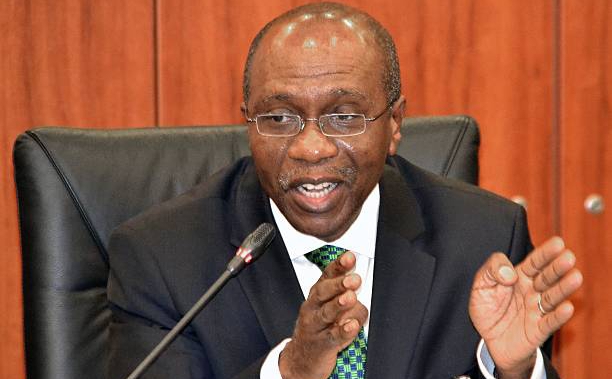CIBN 56th DINNER: Emefiele gives insights on roadmap for Nigeria’s recovery in…
Governor of Central Bank of Nigeria, CBN, Godwin Emefiele, Friday revealed some of the big steps taken by the apex bank to ensure Nigeria attain an economic rebound following the COVID-19 global crisis which disrupted the world economy.
The CBN Governor, Godwin Emefiele, who made the revelation in his keynote address at the 56th Chartered Institute of Bankers of Nigeria (CIBN) Annual Bankers Dinner held in Lagos listed key roles eNaira will play in stimulating financial transactions in the country and adduced that the much-awaited Infrastructure Corporation (InfraCorp); plans to establish Nigerian International Financial Centre(NIFC) among others will catalyze further growth of Nigeria’s economy.
According to Emefiele, eNaira, has recorded 600,000 downloads on its application (App) four weeks after it was launched on October 25, 2021.
LISTEN TO AUDIO:Video Player00:0005:44
He mentioned that efforts are ongoing to encourage faster adoption of the eNaira by Nigerians who do not have smartphones.
The CBN Governor said the introduction of eNaira would fast-track the implementation of the financial inclusion strategy of the apex bank introduced in 2012.
He noted that the digital currency initiative will ensure that Nigerians in remote areas conduct financial activities using their devices at little or no cost, adding that the facilitation of payment systems was a major focus of his tenure.
According to him, although some achievement had been recorded, improving access to finance for individuals and businesses through digital channels remains a priority as about 36 percent of adult Nigerians are confirmed to be unbanked.
“A key focus of the Central Bank of Nigeria under my leadership has been enabling the build-out of a robust payment system in Nigeria, that will provide cheap, efficient, and faster means of conducting payments for most Nigerians.”
“It is in this vein that the Central Bank of Nigeria recently deployed the first central bank digital currency in Africa, the eNaira, which would help in attaining our goals of fostering greater inclusion using digital channels, supporting cross border payments for businesses and firms, and providing a reliable channel for remittance inflows into the country.
“The eNaira will ensure that Nigerians in remote areas can conduct financial activities using their digital devices at little or no cost.
“It will also help to strengthen the effectiveness of government intervention programs, as funds provided will get to the intended beneficiaries. In less than 4 weeks since its launch almost 600,000 downloads of the eNaira application have taken place.
“Efforts are ongoing to encourage faster adoption of the e-naira by Nigerians who do not have smartphones.
“The support of the financial industry will be critical in the ongoing deployment of the eNaira and efforts are on-going to encourage continued partnership between the CBN and stakeholders in the financial industry.”
Emefiele said that the growing pace of digitalization globally makes it essential for Nigeria to leverage digital channels in fulfilling the financial inclusion objective as transaction volumes have grown exponentially between 2018 and 2020 hitting over 3.3 billion financial transactions in 2020.
“With the growing pace of digitization globally, it is essential that we leverage digital channels in fulfilling this objective.
“Total transaction volumes using digital channels more than doubled between 2018 and 2020, as volumes rose from 1.3bn to over 3.3bn financial transactions in 2020.
“Digital payment channels also help to support continued conduct of business activities during the lockdown.
He said that Nigeria’s robust payment system has continued to evolve towards meeting the needs of households and businesses in Nigeria.
“Reflective of the confidence in our payment system, between 2015 and September 2021, about $900m has been invested in firms run by Nigerian founders.”
Emefiele stated that the CBN had taken steps to support the Federal Government in building infrastructure to achieve rapid economic development across the country.
He said that the decline in revenues made this initiative imperative.
“With the decline in revenues due to the federal and state government as a result of reduced receipts from the sale of crude oil, alternative ways of funding infrastructure are critical if we are to ensure sustained growth of our economy.
“As we are all aware, the cost of logistics is often seen as a significant impediment to the growth of businesses in the country.
“In recognition of the role improved infrastructure could play in the development of our economy, along with the need to leverage private sector capital in funding the over N35 trillion deficit, which is the estimated amount required to build an efficient infrastructure ecosystem in Nigeria, the Central Bank of Nigeria (CBN) working in partnership with critical stakeholders such as the Nigerian Sovereign Investment Authority (NSIA) and African Finance Corporation (AFC) set up Infracorp.
“Infracorp is expected to raise over N15 trillion to support investment in critical infrastructure in Nigeria.
“So far, N1 trillion has been provided as seed funds by the promoters to support the operations of Infracorp.
“We recently appointed four fund managers, and a Management Team has been selected to run and manage Infracorp.
“Over the next two months, Infracorp will kick off its operations by targeting strategic infrastructure projects that would help catalyze further growth of our economy.
“Infracorp is expected to set the standard template that will help in enabling greater private sector funding for public infrastructure projects in Nigeria.”
He also announced plans to establish the Nigerian International Financial Centre, NIFC.
He said the initiative will consolidate the growth and resilience of Nigerian banks in the last decade.
He added that the NIFC will act as an international gateway for Capital and investments, driven by technology and payment system infrastructure.
(Lagos Business News)




